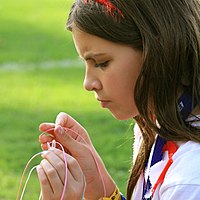
Photo from wikipedia
Our understanding of mind wandering (MW) has dramatically increased over the past decade. Studies have shown that in the vast majority of cases, MW is directed to times other than… Click to show full abstract
Our understanding of mind wandering (MW) has dramatically increased over the past decade. Studies have shown that in the vast majority of cases, MW is directed to times other than the present, and a bias toward the future has been reported (prospective bias). The processing of time is not independent of the processing of space: humans represent time along a spatial continuum, on a “mental time line” (MTL). In cultures with a left to right reading/writing system, the MTL expands from left to right. Capitalizing on these findings, here we aimed at investigating the effects of visuo-spatial processing on the temporal orientation of spontaneous MW, and specifically we asked whether we could steer the temporal focus of MW towards the past or the future, by experimentally inducing a leftward and a rightward orienting of attention, respectively. To this aim, we experimentally manipulated the spatial orientation demands associated with the focal task in two independent groups, with a leftward orienting of attention (left-pointing arrows, LA group) and a rightward orienting of attention (right-pointing arrows, RA group). We found that the temporal orientation of MW critically depended on the spatial orientation demands of the task: specifically, the proportion of spontaneous past-oriented MW episodes was higher under the induction of a leftward orienting attention (LA group) than under the induction of a rightward orienting attention (RA group). The opposite pattern was found for spontaneous future-oriented MW episodes. Possible mechanisms involved in this effect and their implications for research on MW and spontaneous cognition are discussed.
Journal Title: Psychological Research
Year Published: 2019
Link to full text (if available)
Share on Social Media: Sign Up to like & get
recommendations!